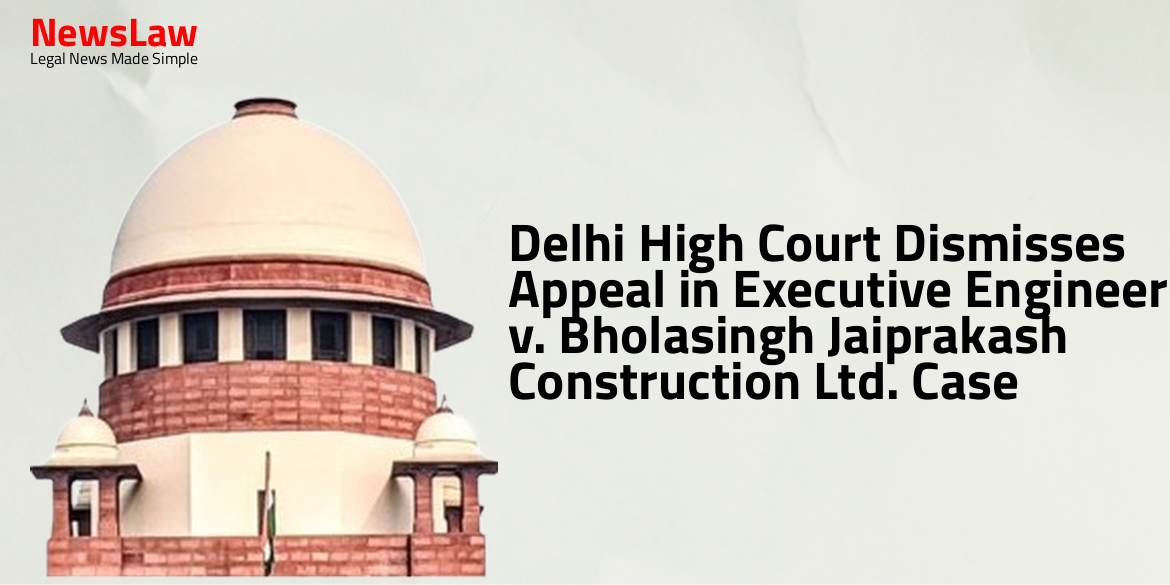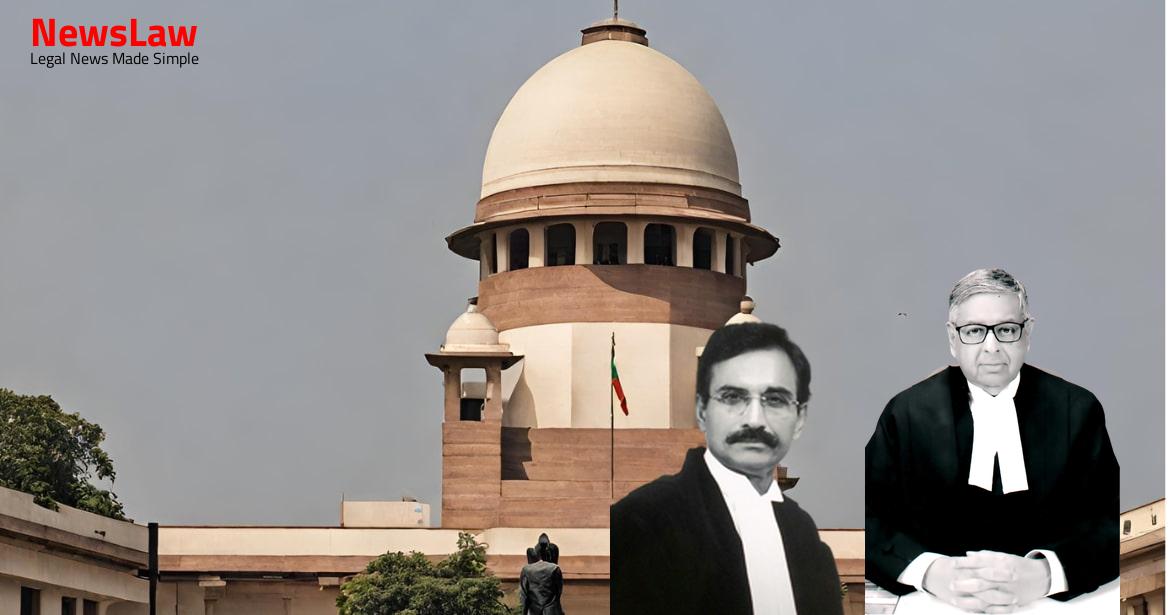A significant legal case regarding the reservation and de-reservation of land in the municipal limits of Nagar Parishad in the city of Morshi has been concluded by the Supreme Court of India. The case involved the interpretation of Section 127 of the Act and the timelines set for land acquisition. The judgment highlights the importance of protecting landowners’ rights and ensuring lawful procedures in the acquisition process.
Facts
- The High Court considered the arguments presented by the parties.
- The Court analyzed the relevant legal provisions and precedents.
- The Court assessed the facts and circumstances of the case.
- The decision was made based on the interpretation of law and application of facts.
- Appellant, a partnership firm, filed a Writ Petition for declaration that the reservation of their land has lapsed under Section 127 of the Act.
- High Court dismissed the writ petition stating that the second notice was sent prematurely and did not satisfy the procedures required for de-reserving the land under Section 127.
- High Court also found the second notice dated 31.08.2015 as unsatisfactory, leading to the dismissal of the petition.
- The expenditure for land acquisition should be done as per the government-defined guidelines.
- A fresh proposal for land acquisition was submitted by the concerned party on 16.12.2016.
- There was a subsequent proposal for land acquisition submitted on 14.01.2016, but it was deemed not in order by the Collector.
- Appellant approached the Supreme Court after being aggrieved by the High Court’s dismissal of the writ petition.
- The disputed land is situated in the municipal limits of Nagar Parishad of the city of Morshi and was reserved for shopping center and garden as per the development plan.
- A notice under Section 127 was served on 13.07.2015 and a second notice on 31.08.2015 by the appellant.
- The standing committee approved the expenses to be incurred for the acquisition of the land.
- It was decided in a General Body Meeting on 30.11.2015 that the disputed land was required for the development of a garden/park, but no further progress was made.
Arguments
- Appellant contends that the second notice was received by the respondent authorities on 02.09.2015, not on 01.09.2015.
- Appellant relies on meeting minutes to support the claim that their notice was not premature.
- Appellant argues that authorities did not take adequate steps to acquire the land as per Section 127 of the Act, leading to de-reservation.
- The appellant’s notice was served before the completion of 10 years from the date the Final Developmental Plan came into force.
- The High Court’s order aimed to protect the public interest and ensure that lapsing provisions do not defeat the Act’s purpose.
- The High Court has rightly observed that the 10-year period mentioned in Section 127 of the Act is yet to complete before serving the notice under Section 127.
- The notice issued by the appellant to Municipal Council, Morshi is considered premature according to the provisions of the Act.
- The contention is that the notice under Section 127 is premature as the 10-year period has not elapsed.
Also Read: CRPF Act: Validity of Rule 27 for Compulsory Retirement – Case of Head Constable vs. CRPF
Analysis
- The statutory provision under Section 127 (1) of the Act has a clear and categorical requirement for Municipalities to take actions within 24 months from the service of notice to acquire or take steps for acquiring land.
- The time limit for serving the notice accrues from the end date of the stipulated period of ten years, indicating a strict timeline for acquisition.
- The High Court’s reliance solely on acknowledgment rather than the acknowledged date raises questions on factual findings.
- Any delay in the acquisition process could lead to undue deprivation of property rights and benefits for the landowners.
- The discretion under sub-section 2 of Section 127 lays with the Government to choose which land to de-reserve, making it crucial for timely actions by the Municipalities.
- A holistic reading of Sections 125 to 127 of the Act shows a departure from the provisions of the 1894 Act, ensuring landowners’ rights are not overlooked.
- The legislative intent behind amendments in 2009 and 2015 was to provide Municipalities with sufficient time for acquisition processes.
- Mandatory requirements under the Act prevent arbitrary deprivation of property and emphasize lawful procedures for land acquisition.
- The case raises concerns over the delayed acquisition process and the need for adherence to statutory timelines for fair resolution.
- Section 127(1) of the Act states that if land reserved, allotted, or designated in a final regional plan or developmental plan is not acquired by agreement within ten years, the owner can serve a notice to the relevant authority.
- The notice must be accompanied by documents showing the owner’s title or interest in the land.
- If within twenty-four months of serving the notice, the land is not acquired or no steps are taken for its acquisition, the reservation, allotment, or designation is deemed to have lapsed.
- After the lapse, the land is released from reservation and becomes available for the owner’s development.
- The government is required to notify the lapsing of reservation, allocation, or designation through an order published in the Official Gazette.
- Steps towards the acquisition commence when the State Government takes active steps for the acquisition of the land.
- Publication of the declaration under Section 6 of the 1894 Act indicates the initiation of the acquisition process.
- Interpreting Sections 126 and 127 of the 1966 Act otherwise would render the provisions unworkable, disadvantageous to the landowner.
- The phrase ‘no steps as aforesaid’ in Section 127 should be understood in the context of the 1894 Act.
- Mere resolution passing by the Planning Authority or correspondence with the Collector/State Government does not signify the commencement of acquisition proceedings under the 1966 or 1894 Acts.
- Adverse remarks against the advocate expunged from the record.
- Reservation of appellant’s land has lapsed, making it available for development.
- Balance between eminent domain and constitutional property rights to be maintained.
- Declaration in Official Gazette is consequential after satisfaction of conditions under sub-section 127(1).
- Sub-section 2 of Section 127 indicates that on lapsing of reservation, allocation or designation of land, it becomes available for other permissible uses.
- Imperative nature of the sub-section places a duty on the Government to publish the same.
- Requirement under Section 127(1) found to be fully satisfied in the present case.
Also Read: DAMEPL vs. DMRC: Curative Petition and Arbitral Award Restoration
Decision
- The State Government is directed to notify the lapsing of the reservation by an order to be published in the Official Gazette.
- Notification should be done as per the requirements of Section 127(2) of the Act.
- The notification should be made expeditiously and preferably within a period of 4 months from today.
- The appeal stands allowed with the mentioned directions.
Case Title: BALAJI ASSOCIATES THROUGH ITS PARTNERS Vs. THE STATE OF MAHARASHTRA
Case Number: C.A. No.-006661-006661 / 2019



